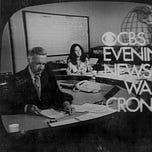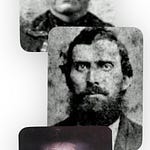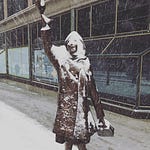"That’s the way it is," Walter would say.
"Like hell it is," my father would answer.
If it was 5:30 on a weekday, two things were certain: our old black-and-white TV was tuned to CBS Evening News with Walter Cronkite, and Dad was seated across the room in his shabby, plastic-covered recliner with a freshly lit Salem.
As a kid growing up down South, I had to make a choice: side with Walter or my dad.
My father felt that Walter had betrayed us. 1960s Mississippi was Ground Zero for civil rights. Each evening this well-mannered man came into our living room and, in that even-toned voice, revealed to the entire world the latest Mississippi atrocity. He drew attention to the smoldering ashes of a recently burned Black church. Or showed news footage of the National Guard dragging a nearby swamp for yet another civil rights activist, of mobs viciously assaulting Freedom Riders.
Some complained that Walter sounded too indignant about it all. Like he thought it was our fault. Most of white Mississippi took it personally. In the early '60s, we figured we thought like everybody else in the country, except for a few fanatics. Those people burning crosses and throwing bombs weren’t us – they were low-class folks, white trash. The Black integrators and agitators? They were outsiders, Yankees and Communists trying to stir up trouble. Why didn’t Walter tell that story?
The fact is, we truly believed the racist violence had nothing to do with us – we saw ourselves as "good folks," not enablers. We couldn’t understand how Walter could blame us as a people. The hurt was visible in my father’s face. To him, it must have been like being bad-mouthed in public by a trusted friend.
This kind of national media exposure was new for white Mississippians, who are a camera-shy people. We are sensitive about our poverty and lack of worldly sophistication and easily shamed. We are fearful of being misunderstood. Just a few years before the Civil Rights movement became a televised phenomenon, it was a rare but thrilling experience to see a Mississippian on national TV. When a sighting did occur, it was usually on a game show or a Miss America Pageant. People would near about go crazy. Call up everybody they knew: "There’s going to be a girl from Yazoo City on Truth or Consequences."
The entire population of the state would sit there and wait for that Mississippi girl to make us all proud when she took her chances with Bob Barker. Men would come out of the fields to see it. The next day it would be in the paper.
But in the early '60s, the cameras arrived, and Mississippians were on TV news almost every night. Caught off guard, we would blurt out things like, "Y’all just see our bad side. We’re the Hospitality State, you know," while in the background a bunch of good ole boys could be seen trying to burn down the state university over integration.
The violent scenes Walter Cronkite showed of Mississippi were at odds with the image of a God-fearing people that my parents, teachers, and preacher would have me believe. In a calm, reasoned voice, Walter called out murder, brutality, and racism by name. He took his journalistic stand and risked our fury.
But still, everybody watched him, feeling it was best to know first-hand what we were being charged with. In those days, there was no Fox News to provide solace for our bigotry.
On Sunday mornings, I joined my father on the church steps, where the men gathered to smoke their cigarettes before preaching began. They smelled of Vitalis Hair Cream. Their black shoes shined like the backs of beetles. I heard them mumble resentfully, "Walter sure came down hard on us again, didn’t he?"
On those church steps, I heard Walter accused of being everything from an atheist to a communist to the worst charge of all, an unadulterated "n— lover."
But in the end, I chose Walter over my own people. I wanted to be just like him. I would sit there, studying his image as it flickered in black and white. I practiced removing my glasses in a manner that signaled weighty reflection. I imitated his speech. Walter did more for me than any grammar class. He said "corner," not "co’ner," and "rinse," not "rench." And you would never catch Walter saying "ain’t" or "fixing to." By the time I was thirteen, I had nearly dropped my southern accent altogether. One of the greatest compliments I could receive was, "You’re not from around here, are you?"
And the truth is, I didn’t feel like I was from around there. Walter’s calm, reasoned voice was far removed from the hateful rhetoric of the fire-breathing politicians and preachers who spoke for my state during that age. His clear, unequivocal pronouncements penetrated the insanity of the Magnolia Curtain. His demeanor suggested that perhaps there was a place in the world where thoughtfulness and acceptance triumphed over violence and prejudice. I wanted to find that place and live there.
I wish I could say this was due to some noble instinct I possessed, that even at that age I was open-minded and despised racial prejudice. I would be lying. It had nothing to do with compassion for Black folks. I was a product of my surroundings. I was a bigoted white child like all my friends. But I did possess my own differences – ones that were becoming harder to hide, ones that I sensed would soon put me at risk in my southern town. My mother said to ignore the school bullies when they called me "sissy" or "queer." She said I was special, but being "special" in Mississippi could near about get you killed.
Although I had never heard Walter Cronkite – or anyone else – mention gay people, I couldn’t help but believe he would do his best to protect me, to speak up on my behalf, to report only the truth about me. I had witnessed the depth of his compassion, the essence of his humanity, on the day Kennedy died. Here was a man who publicly wept over another man. His presence in my living room each evening was a welcome refuge for a thirteen-year-old boy running out of places to hide. Walter made me believe that there was an America where people wouldn’t shun me if I couldn’t throw a ball or loved to read or didn’t have the slightest desire for a girlfriend.
I didn’t know where Walter Cronkite lived, but one day I knew I would make my way to the America he spoke for. I would be ready.
"That’s the way it is," he told us, and against the wishes of my people, I believed him.













